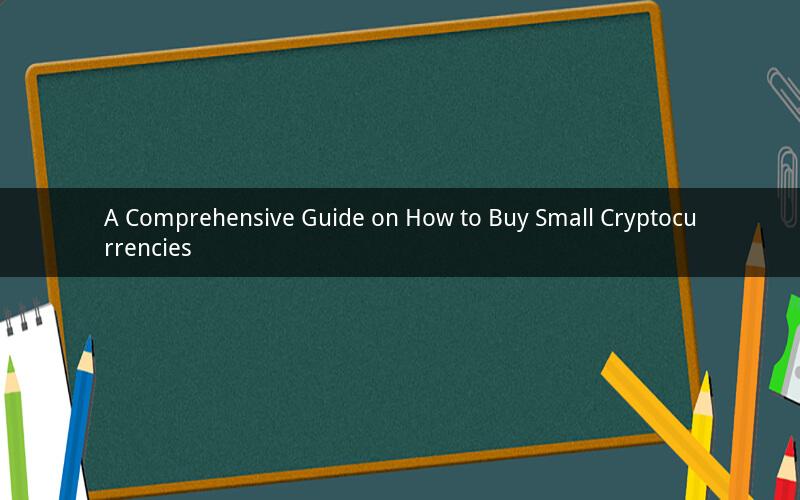
Buying small cryptocurrencies, often referred to as altcoins, can be a thrilling and potentially profitable venture. However, it requires knowledge, caution, and a well-thought-out strategy. This article will delve into the intricacies of purchasing small cryptos, covering the necessary steps, risks, and best practices to help you make informed decisions.
1. Understanding Small Cryptocurrencies
Before diving into the process of buying small cryptos, it's crucial to understand what they are. Small cryptocurrencies, or altcoins, are digital assets that are not Bitcoin or Ethereum. These coins often have a lower market capitalization and are less well-known, making them more volatile and speculative.
1.1 The Rise of Altcoins
Altcoins were born as an alternative to Bitcoin, aiming to address some of its limitations, such as scalability and transaction fees. As the cryptocurrency market evolved, numerous altcoins were developed, each with unique features and use cases.
1.2 Risks Associated with Altcoins
Buying small cryptos comes with inherent risks. Due to their lower market capitalization, altcoins are more susceptible to market volatility and manipulation. Moreover, many altcoins lack a strong community or use case, which can affect their long-term viability.
2. Researching and Choosing Altcoins
Before investing in any altcoin, thorough research is essential. This section will guide you through the process of researching and selecting small cryptocurrencies.
2.1 Identifying Potential Altcoins
To find potential altcoins, start by exploring cryptocurrency exchanges, forums, and social media platforms. Look for projects with a compelling use case, active development, and a strong community. Some popular altcoins to consider include Litecoin, Ripple, and Cardano.
2.2 Analyzing Market Data
Analyze the market data for each altcoin you're considering. Look at factors such as market capitalization, trading volume, and price trends. Be cautious of altcoins with low trading volume, as they can be more susceptible to manipulation.
2.3 Reading Whitepapers and Roadmaps
Whitepapers and roadmaps provide valuable insights into a project's goals, technology, and future plans. Make sure to read these documents thoroughly to understand the project's vision and potential.
3. Setting Up a Cryptocurrency Wallet
To store your small cryptos, you'll need a cryptocurrency wallet. This section will guide you through the process of choosing and setting up a wallet.
3.1 Types of Cryptocurrency Wallets
There are various types of wallets available, including software wallets, hardware wallets, and paper wallets. Each has its own advantages and disadvantages. Software wallets are convenient but less secure, while hardware wallets offer the highest level of security.
3.2 Choosing the Right Wallet
When choosing a wallet, consider factors such as security, ease of use, and compatibility with the altcoins you plan to buy. Some popular wallets for small cryptos include MetaMask, Trust Wallet, and Ledger Nano S.
3.3 Setting Up Your Wallet
Once you've chosen a wallet, follow the provided instructions to set it up. Make sure to backup your wallet's private keys or recovery phrase, as losing this information can result in permanent loss of your funds.
4. Buying Small Cryptocurrencies
Now that you've done your research and set up a wallet, it's time to buy small cryptos. This section will guide you through the process of purchasing altcoins.
4.1 Choosing a Cryptocurrency Exchange
To buy small cryptos, you'll need to use a cryptocurrency exchange. Choose an exchange with a good reputation, strong security measures, and a wide range of altcoins available. Some popular exchanges include Binance, Coinbase, and Kraken.
4.2 Depositing Funds
Once you've registered and verified your account on the exchange, deposit funds into your exchange wallet. You can deposit fiat currency or cryptocurrencies, depending on the exchange's offerings.
4.3 Buying Altcoins
Navigate to the altcoin market section of the exchange and select the altcoin you wish to buy. Enter the amount of cryptocurrency or fiat currency you want to spend, and place your order.
5. Storing and Managing Your Altcoins
After purchasing small cryptos, it's essential to store and manage them properly to ensure their security and potential growth.
5.1 Storing Altcoins
Transfer your altcoins from the exchange wallet to your cryptocurrency wallet. This will help you avoid the risks associated with holding funds on an exchange.
5.2 Monitoring Your Investments
Keep an eye on the market performance of your altcoins. Stay informed about news and developments related to the projects you've invested in.
5.3 Selling Altcoins
When it's time to sell your altcoins, navigate to the exchange's market section and place a sell order. Be aware of transaction fees and market volatility when deciding when to sell.
Frequently Asked Questions
1. Q: Are small cryptocurrencies a good investment?
A: Investing in small cryptocurrencies can be risky, but it can also offer significant rewards. Conduct thorough research and consider your risk tolerance before investing.
2. Q: How can I protect my altcoins from theft?
A: Store your altcoins in a secure wallet, such as a hardware wallet or a reputable software wallet. Always keep your private keys or recovery phrase safe and never share them with others.
3. Q: What is the best way to research altcoins?
A: Start by exploring cryptocurrency exchanges, forums, and social media platforms. Read whitepapers, roadmaps, and market data to make informed decisions.
4. Q: How can I avoid scams when buying small cryptos?
A: Be cautious of projects with no clear vision, lack of community support, or suspicious market activity. Conduct thorough research and never invest in altcoins that seem too good to be true.
5. Q: Can I buy small cryptos with fiat currency?
A: Some exchanges allow you to buy altcoins using fiat currency, while others require you to first purchase Bitcoin or Ethereum and then trade those for altcoins. Check the offerings of your chosen exchange to see which options are available.